Impact of Globalization on Business Functions: A Research Project
VerifiedAdded on 2021/01/01
|7
|1616
|460
Report
AI Summary
This report presents research on the impact of globalization on various business functions, focusing on ethical and economic effects. The assignment aims to evaluate the positive impact of globalization on John Lewis, identifying its importance, analyzing barriers, and evaluating challenges. The research employs a deductive approach and interpretivism philosophy, utilizing a descriptive research design. Data is collected primarily from primary sources, with simple random sampling. The report covers data analysis, ethical considerations, and research limitations, providing a comprehensive overview of globalization's effects on business operations. The literature review highlights globalization's role in expanding market opportunities, enhancing profitability, and improving financial resource sourcing. References include key texts on business ethics and research methodologies. The report showcases the student's research and analytical skills.

Managing A Successful Business Project
Paraphrase This Document
Need a fresh take? Get an instant paraphrase of this document with our AI Paraphraser
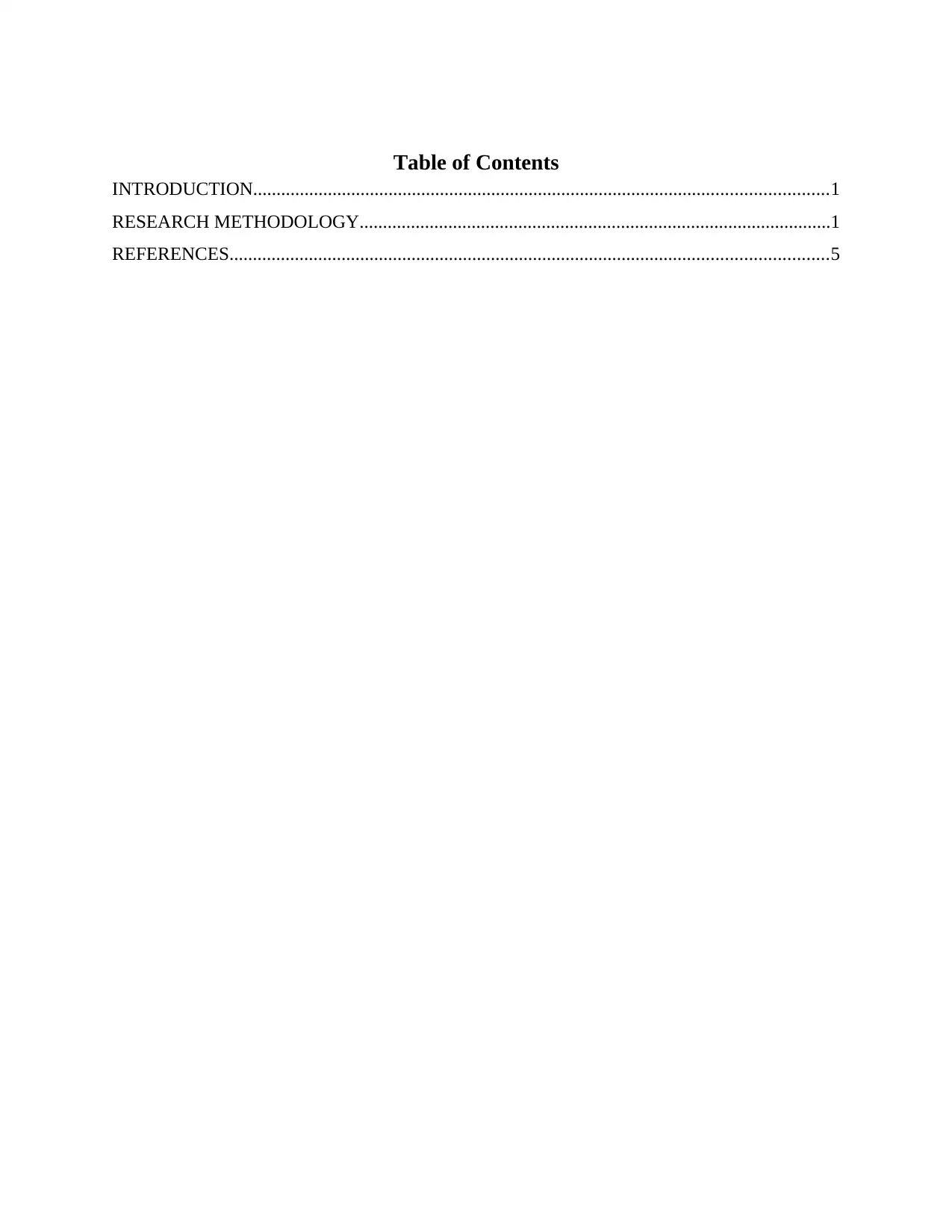
Table of Contents
INTRODUCTION...........................................................................................................................1
RESEARCH METHODOLOGY.....................................................................................................1
REFERENCES................................................................................................................................5
INTRODUCTION...........................................................................................................................1
RESEARCH METHODOLOGY.....................................................................................................1
REFERENCES................................................................................................................................5
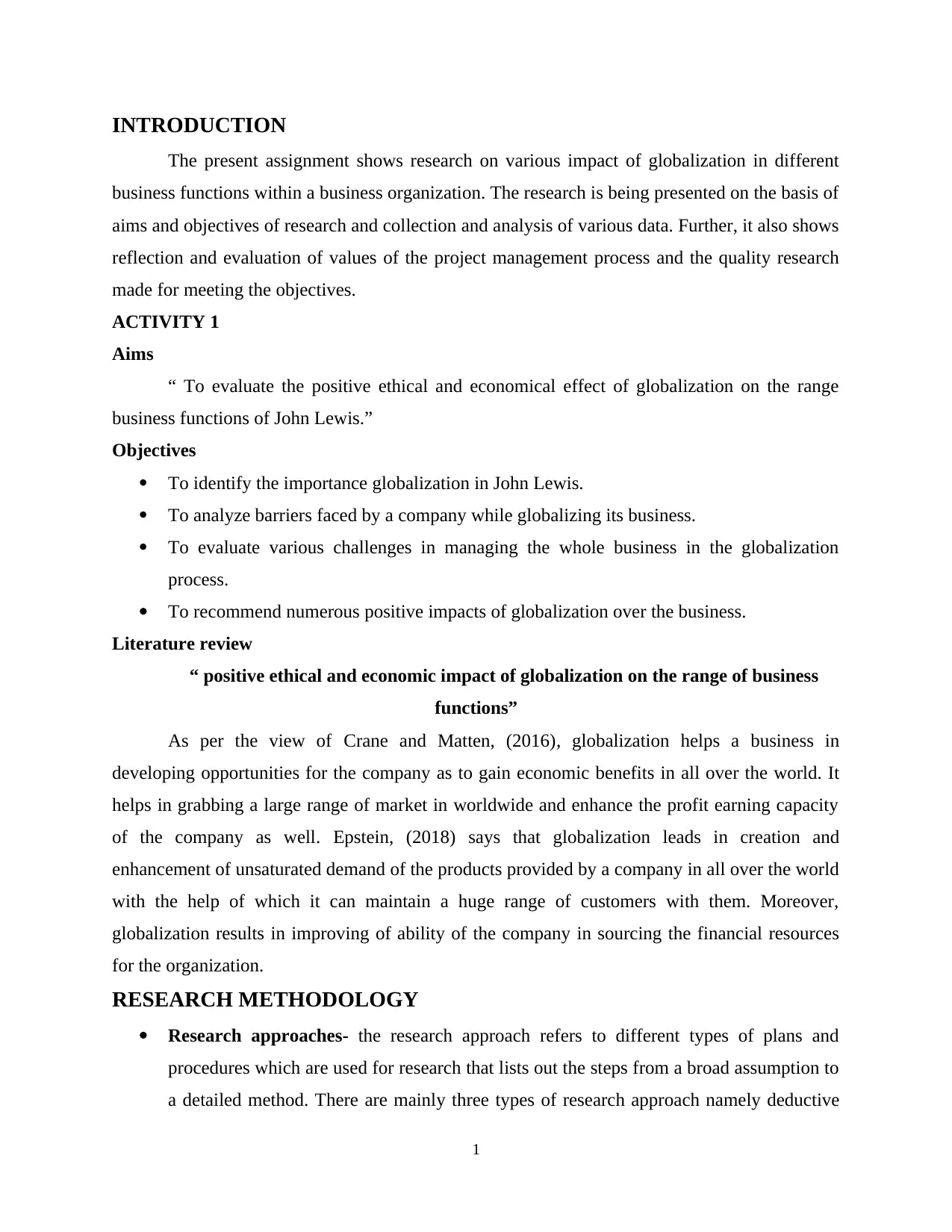
INTRODUCTION
The present assignment shows research on various impact of globalization in different
business functions within a business organization. The research is being presented on the basis of
aims and objectives of research and collection and analysis of various data. Further, it also shows
reflection and evaluation of values of the project management process and the quality research
made for meeting the objectives.
ACTIVITY 1
Aims
“ To evaluate the positive ethical and economical effect of globalization on the range
business functions of John Lewis.”
Objectives
To identify the importance globalization in John Lewis.
To analyze barriers faced by a company while globalizing its business.
To evaluate various challenges in managing the whole business in the globalization
process.
To recommend numerous positive impacts of globalization over the business.
Literature review
“ positive ethical and economic impact of globalization on the range of business
functions”
As per the view of Crane and Matten, (2016), globalization helps a business in
developing opportunities for the company as to gain economic benefits in all over the world. It
helps in grabbing a large range of market in worldwide and enhance the profit earning capacity
of the company as well. Epstein, (2018) says that globalization leads in creation and
enhancement of unsaturated demand of the products provided by a company in all over the world
with the help of which it can maintain a huge range of customers with them. Moreover,
globalization results in improving of ability of the company in sourcing the financial resources
for the organization.
RESEARCH METHODOLOGY
Research approaches- the research approach refers to different types of plans and
procedures which are used for research that lists out the steps from a broad assumption to
a detailed method. There are mainly three types of research approach namely deductive
1
The present assignment shows research on various impact of globalization in different
business functions within a business organization. The research is being presented on the basis of
aims and objectives of research and collection and analysis of various data. Further, it also shows
reflection and evaluation of values of the project management process and the quality research
made for meeting the objectives.
ACTIVITY 1
Aims
“ To evaluate the positive ethical and economical effect of globalization on the range
business functions of John Lewis.”
Objectives
To identify the importance globalization in John Lewis.
To analyze barriers faced by a company while globalizing its business.
To evaluate various challenges in managing the whole business in the globalization
process.
To recommend numerous positive impacts of globalization over the business.
Literature review
“ positive ethical and economic impact of globalization on the range of business
functions”
As per the view of Crane and Matten, (2016), globalization helps a business in
developing opportunities for the company as to gain economic benefits in all over the world. It
helps in grabbing a large range of market in worldwide and enhance the profit earning capacity
of the company as well. Epstein, (2018) says that globalization leads in creation and
enhancement of unsaturated demand of the products provided by a company in all over the world
with the help of which it can maintain a huge range of customers with them. Moreover,
globalization results in improving of ability of the company in sourcing the financial resources
for the organization.
RESEARCH METHODOLOGY
Research approaches- the research approach refers to different types of plans and
procedures which are used for research that lists out the steps from a broad assumption to
a detailed method. There are mainly three types of research approach namely deductive
1
⊘ This is a preview!⊘
Do you want full access?
Subscribe today to unlock all pages.

Trusted by 1+ million students worldwide
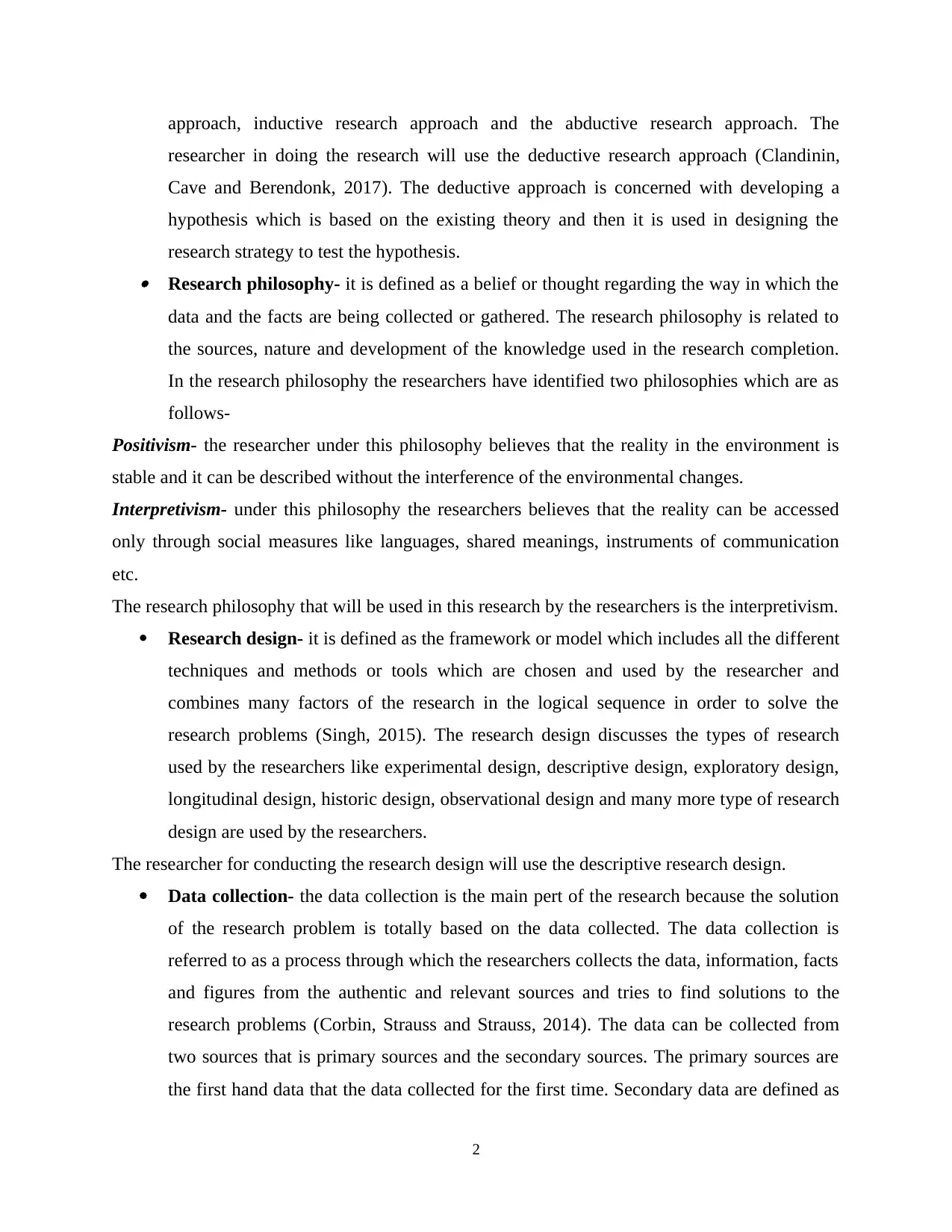
approach, inductive research approach and the abductive research approach. The
researcher in doing the research will use the deductive research approach (Clandinin,
Cave and Berendonk, 2017). The deductive approach is concerned with developing a
hypothesis which is based on the existing theory and then it is used in designing the
research strategy to test the hypothesis. Research philosophy- it is defined as a belief or thought regarding the way in which the
data and the facts are being collected or gathered. The research philosophy is related to
the sources, nature and development of the knowledge used in the research completion.
In the research philosophy the researchers have identified two philosophies which are as
follows-
Positivism- the researcher under this philosophy believes that the reality in the environment is
stable and it can be described without the interference of the environmental changes.
Interpretivism- under this philosophy the researchers believes that the reality can be accessed
only through social measures like languages, shared meanings, instruments of communication
etc.
The research philosophy that will be used in this research by the researchers is the interpretivism.
Research design- it is defined as the framework or model which includes all the different
techniques and methods or tools which are chosen and used by the researcher and
combines many factors of the research in the logical sequence in order to solve the
research problems (Singh, 2015). The research design discusses the types of research
used by the researchers like experimental design, descriptive design, exploratory design,
longitudinal design, historic design, observational design and many more type of research
design are used by the researchers.
The researcher for conducting the research design will use the descriptive research design.
Data collection- the data collection is the main pert of the research because the solution
of the research problem is totally based on the data collected. The data collection is
referred to as a process through which the researchers collects the data, information, facts
and figures from the authentic and relevant sources and tries to find solutions to the
research problems (Corbin, Strauss and Strauss, 2014). The data can be collected from
two sources that is primary sources and the secondary sources. The primary sources are
the first hand data that the data collected for the first time. Secondary data are defined as
2
researcher in doing the research will use the deductive research approach (Clandinin,
Cave and Berendonk, 2017). The deductive approach is concerned with developing a
hypothesis which is based on the existing theory and then it is used in designing the
research strategy to test the hypothesis. Research philosophy- it is defined as a belief or thought regarding the way in which the
data and the facts are being collected or gathered. The research philosophy is related to
the sources, nature and development of the knowledge used in the research completion.
In the research philosophy the researchers have identified two philosophies which are as
follows-
Positivism- the researcher under this philosophy believes that the reality in the environment is
stable and it can be described without the interference of the environmental changes.
Interpretivism- under this philosophy the researchers believes that the reality can be accessed
only through social measures like languages, shared meanings, instruments of communication
etc.
The research philosophy that will be used in this research by the researchers is the interpretivism.
Research design- it is defined as the framework or model which includes all the different
techniques and methods or tools which are chosen and used by the researcher and
combines many factors of the research in the logical sequence in order to solve the
research problems (Singh, 2015). The research design discusses the types of research
used by the researchers like experimental design, descriptive design, exploratory design,
longitudinal design, historic design, observational design and many more type of research
design are used by the researchers.
The researcher for conducting the research design will use the descriptive research design.
Data collection- the data collection is the main pert of the research because the solution
of the research problem is totally based on the data collected. The data collection is
referred to as a process through which the researchers collects the data, information, facts
and figures from the authentic and relevant sources and tries to find solutions to the
research problems (Corbin, Strauss and Strauss, 2014). The data can be collected from
two sources that is primary sources and the secondary sources. The primary sources are
the first hand data that the data collected for the first time. Secondary data are defined as
2
Paraphrase This Document
Need a fresh take? Get an instant paraphrase of this document with our AI Paraphraser
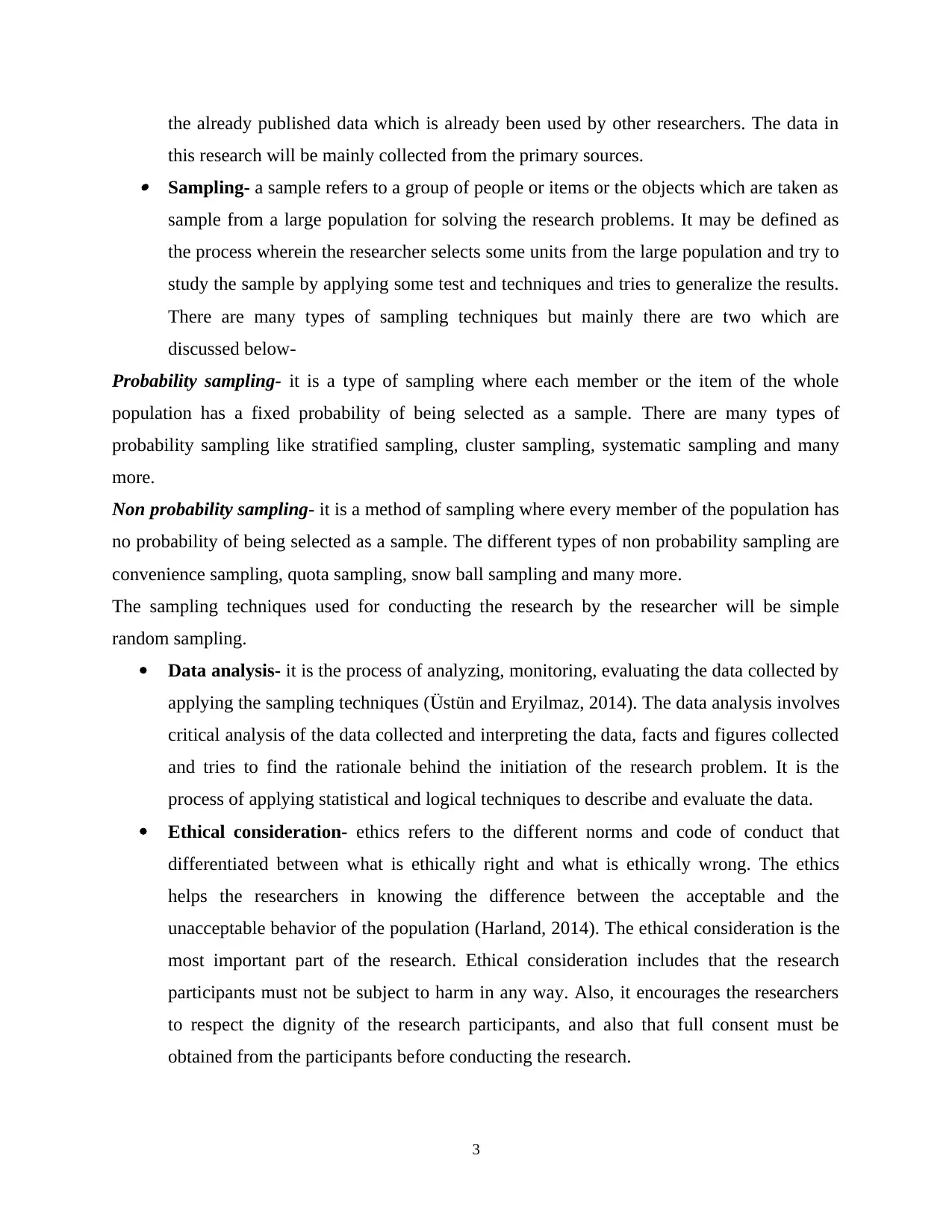
the already published data which is already been used by other researchers. The data in
this research will be mainly collected from the primary sources. Sampling- a sample refers to a group of people or items or the objects which are taken as
sample from a large population for solving the research problems. It may be defined as
the process wherein the researcher selects some units from the large population and try to
study the sample by applying some test and techniques and tries to generalize the results.
There are many types of sampling techniques but mainly there are two which are
discussed below-
Probability sampling- it is a type of sampling where each member or the item of the whole
population has a fixed probability of being selected as a sample. There are many types of
probability sampling like stratified sampling, cluster sampling, systematic sampling and many
more.
Non probability sampling- it is a method of sampling where every member of the population has
no probability of being selected as a sample. The different types of non probability sampling are
convenience sampling, quota sampling, snow ball sampling and many more.
The sampling techniques used for conducting the research by the researcher will be simple
random sampling.
Data analysis- it is the process of analyzing, monitoring, evaluating the data collected by
applying the sampling techniques (Üstün and Eryilmaz, 2014). The data analysis involves
critical analysis of the data collected and interpreting the data, facts and figures collected
and tries to find the rationale behind the initiation of the research problem. It is the
process of applying statistical and logical techniques to describe and evaluate the data.
Ethical consideration- ethics refers to the different norms and code of conduct that
differentiated between what is ethically right and what is ethically wrong. The ethics
helps the researchers in knowing the difference between the acceptable and the
unacceptable behavior of the population (Harland, 2014). The ethical consideration is the
most important part of the research. Ethical consideration includes that the research
participants must not be subject to harm in any way. Also, it encourages the researchers
to respect the dignity of the research participants, and also that full consent must be
obtained from the participants before conducting the research.
3
this research will be mainly collected from the primary sources. Sampling- a sample refers to a group of people or items or the objects which are taken as
sample from a large population for solving the research problems. It may be defined as
the process wherein the researcher selects some units from the large population and try to
study the sample by applying some test and techniques and tries to generalize the results.
There are many types of sampling techniques but mainly there are two which are
discussed below-
Probability sampling- it is a type of sampling where each member or the item of the whole
population has a fixed probability of being selected as a sample. There are many types of
probability sampling like stratified sampling, cluster sampling, systematic sampling and many
more.
Non probability sampling- it is a method of sampling where every member of the population has
no probability of being selected as a sample. The different types of non probability sampling are
convenience sampling, quota sampling, snow ball sampling and many more.
The sampling techniques used for conducting the research by the researcher will be simple
random sampling.
Data analysis- it is the process of analyzing, monitoring, evaluating the data collected by
applying the sampling techniques (Üstün and Eryilmaz, 2014). The data analysis involves
critical analysis of the data collected and interpreting the data, facts and figures collected
and tries to find the rationale behind the initiation of the research problem. It is the
process of applying statistical and logical techniques to describe and evaluate the data.
Ethical consideration- ethics refers to the different norms and code of conduct that
differentiated between what is ethically right and what is ethically wrong. The ethics
helps the researchers in knowing the difference between the acceptable and the
unacceptable behavior of the population (Harland, 2014). The ethical consideration is the
most important part of the research. Ethical consideration includes that the research
participants must not be subject to harm in any way. Also, it encourages the researchers
to respect the dignity of the research participants, and also that full consent must be
obtained from the participants before conducting the research.
3
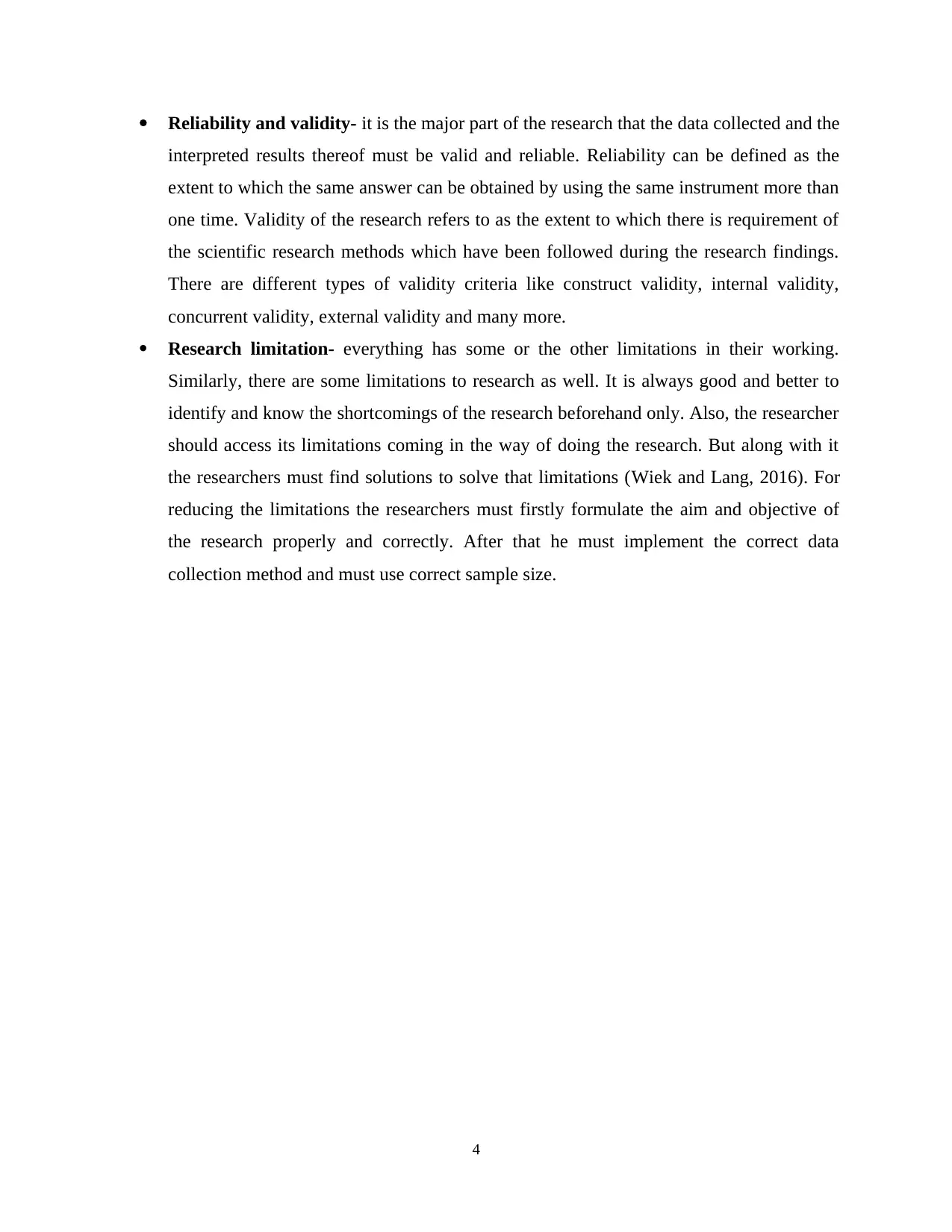
Reliability and validity- it is the major part of the research that the data collected and the
interpreted results thereof must be valid and reliable. Reliability can be defined as the
extent to which the same answer can be obtained by using the same instrument more than
one time. Validity of the research refers to as the extent to which there is requirement of
the scientific research methods which have been followed during the research findings.
There are different types of validity criteria like construct validity, internal validity,
concurrent validity, external validity and many more.
Research limitation- everything has some or the other limitations in their working.
Similarly, there are some limitations to research as well. It is always good and better to
identify and know the shortcomings of the research beforehand only. Also, the researcher
should access its limitations coming in the way of doing the research. But along with it
the researchers must find solutions to solve that limitations (Wiek and Lang, 2016). For
reducing the limitations the researchers must firstly formulate the aim and objective of
the research properly and correctly. After that he must implement the correct data
collection method and must use correct sample size.
4
interpreted results thereof must be valid and reliable. Reliability can be defined as the
extent to which the same answer can be obtained by using the same instrument more than
one time. Validity of the research refers to as the extent to which there is requirement of
the scientific research methods which have been followed during the research findings.
There are different types of validity criteria like construct validity, internal validity,
concurrent validity, external validity and many more.
Research limitation- everything has some or the other limitations in their working.
Similarly, there are some limitations to research as well. It is always good and better to
identify and know the shortcomings of the research beforehand only. Also, the researcher
should access its limitations coming in the way of doing the research. But along with it
the researchers must find solutions to solve that limitations (Wiek and Lang, 2016). For
reducing the limitations the researchers must firstly formulate the aim and objective of
the research properly and correctly. After that he must implement the correct data
collection method and must use correct sample size.
4
⊘ This is a preview!⊘
Do you want full access?
Subscribe today to unlock all pages.

Trusted by 1+ million students worldwide
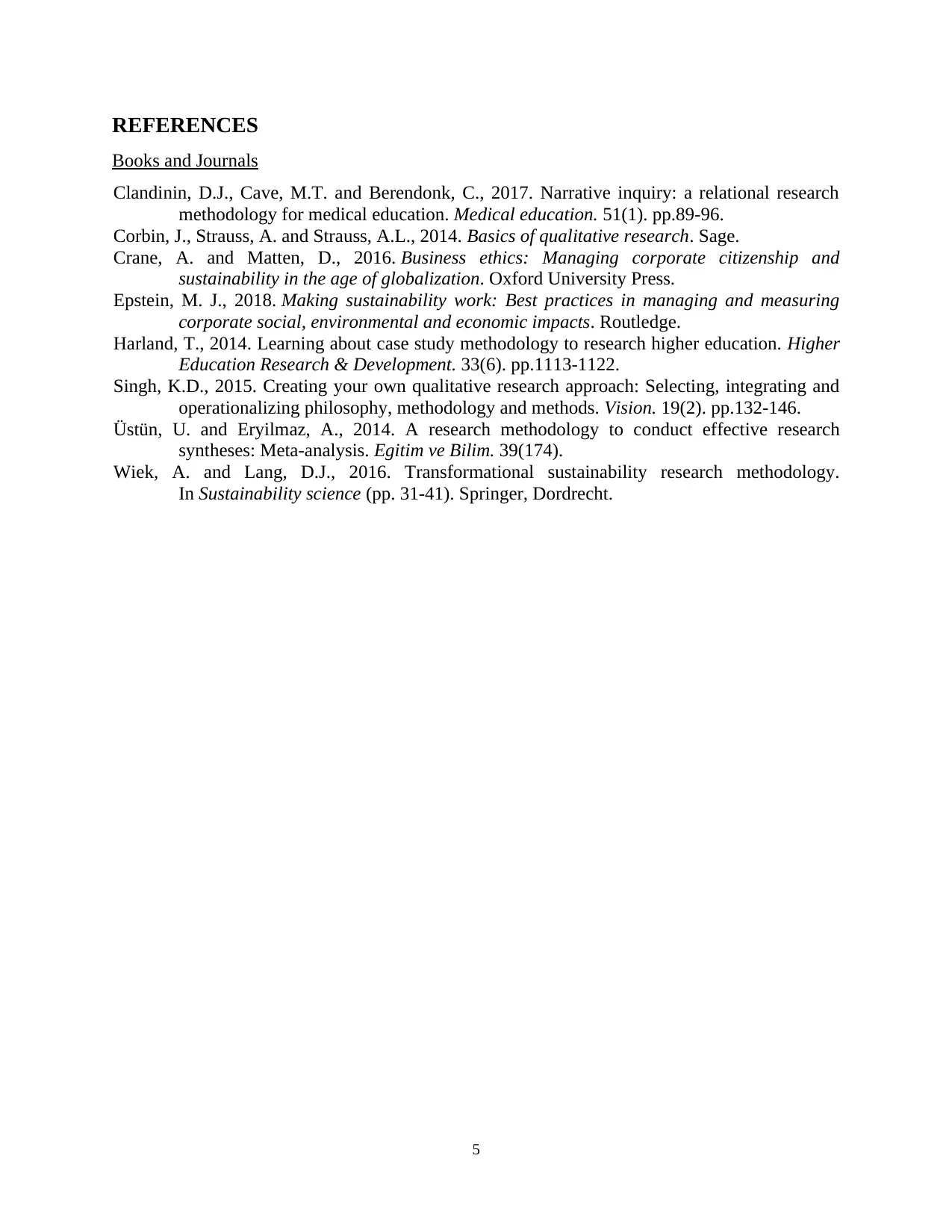
REFERENCES
Books and Journals
Clandinin, D.J., Cave, M.T. and Berendonk, C., 2017. Narrative inquiry: a relational research
methodology for medical education. Medical education. 51(1). pp.89-96.
Corbin, J., Strauss, A. and Strauss, A.L., 2014. Basics of qualitative research. Sage.
Crane, A. and Matten, D., 2016. Business ethics: Managing corporate citizenship and
sustainability in the age of globalization. Oxford University Press.
Epstein, M. J., 2018. Making sustainability work: Best practices in managing and measuring
corporate social, environmental and economic impacts. Routledge.
Harland, T., 2014. Learning about case study methodology to research higher education. Higher
Education Research & Development. 33(6). pp.1113-1122.
Singh, K.D., 2015. Creating your own qualitative research approach: Selecting, integrating and
operationalizing philosophy, methodology and methods. Vision. 19(2). pp.132-146.
Üstün, U. and Eryilmaz, A., 2014. A research methodology to conduct effective research
syntheses: Meta-analysis. Egitim ve Bilim. 39(174).
Wiek, A. and Lang, D.J., 2016. Transformational sustainability research methodology.
In Sustainability science (pp. 31-41). Springer, Dordrecht.
5
Books and Journals
Clandinin, D.J., Cave, M.T. and Berendonk, C., 2017. Narrative inquiry: a relational research
methodology for medical education. Medical education. 51(1). pp.89-96.
Corbin, J., Strauss, A. and Strauss, A.L., 2014. Basics of qualitative research. Sage.
Crane, A. and Matten, D., 2016. Business ethics: Managing corporate citizenship and
sustainability in the age of globalization. Oxford University Press.
Epstein, M. J., 2018. Making sustainability work: Best practices in managing and measuring
corporate social, environmental and economic impacts. Routledge.
Harland, T., 2014. Learning about case study methodology to research higher education. Higher
Education Research & Development. 33(6). pp.1113-1122.
Singh, K.D., 2015. Creating your own qualitative research approach: Selecting, integrating and
operationalizing philosophy, methodology and methods. Vision. 19(2). pp.132-146.
Üstün, U. and Eryilmaz, A., 2014. A research methodology to conduct effective research
syntheses: Meta-analysis. Egitim ve Bilim. 39(174).
Wiek, A. and Lang, D.J., 2016. Transformational sustainability research methodology.
In Sustainability science (pp. 31-41). Springer, Dordrecht.
5
1 out of 7
Related Documents
Your All-in-One AI-Powered Toolkit for Academic Success.
+13062052269
info@desklib.com
Available 24*7 on WhatsApp / Email
![[object Object]](/_next/static/media/star-bottom.7253800d.svg)
Unlock your academic potential
Copyright © 2020–2026 A2Z Services. All Rights Reserved. Developed and managed by ZUCOL.





